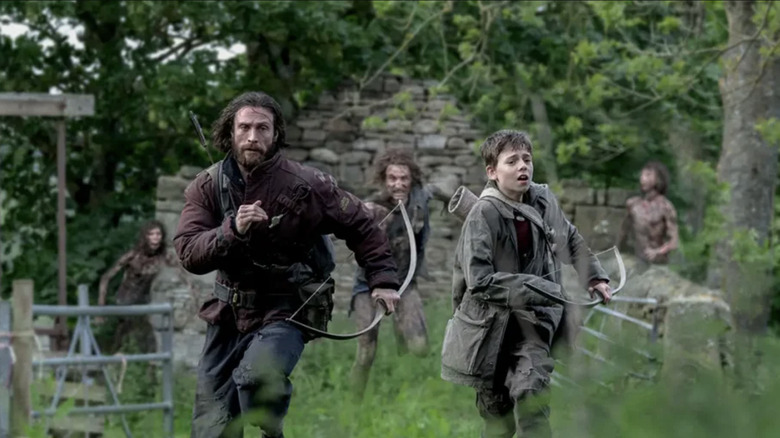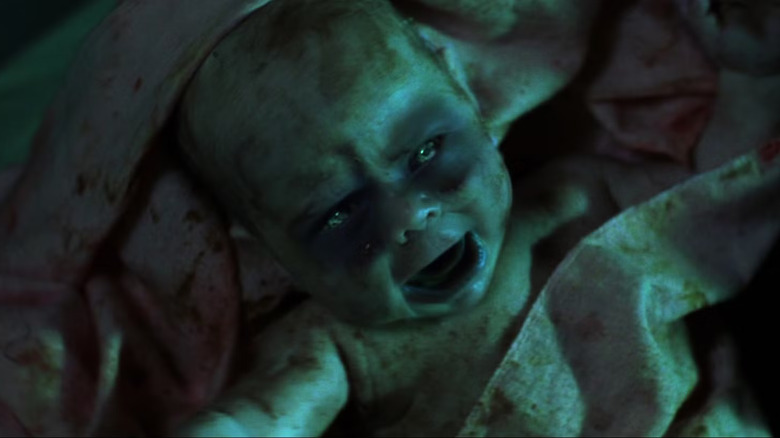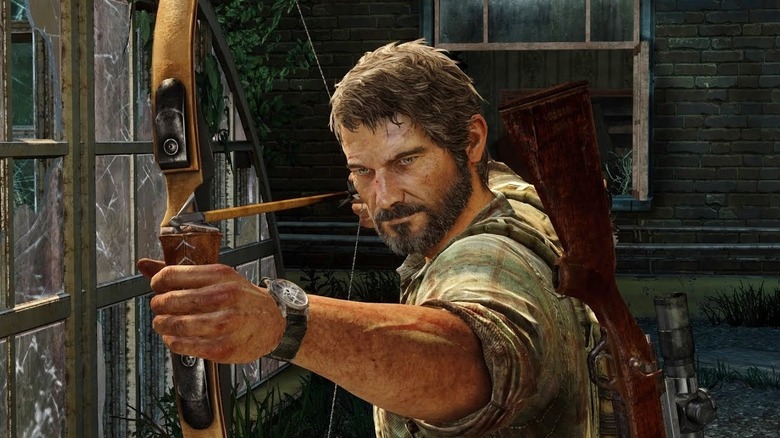How 28 Years Later Channels The Last Of Us And Zack Snyder
This article contains spoilers for "28 Years Later."
It may sound strange — for those of us who lived through it, it's strange to remember — but back before "28 Days Later" was released in 2002 in the UK (and 2003 in the US), the zombie subgenre was all but dead. Director Danny Boyle and writer Alex Garland have been stipulating that the creatures they created are not technically zombies since the film's release, yet the film's rage virus operates in a highly similar fashion to the version of the zombie created and popularized by George A. Romero in 1968's "Night of the Living Dead." While the subgenre of zombie films never entirely ceased after the release of Romero's first movie, it experienced a lull during the 1990s, as genre filmmakers eschewed the typical tropes inherent in the subgenre in favor of experimentation, as seen in films like "Dead Alive," "Cemetery Man," and "My Boyfriend's Back." So, despite its own distinctions from zombie lore, "28 Days Later" for all intents and purposes revitalized the so-called traditional apocalyptic zombie film.
The cultural impact of "28 Days Later" became widespread and significant fairly quickly. Although the "Resident Evil" games had spun off a feature film version also released in 2002, it was Boyle's movie that seemed to have the more immediate influence, as just a few years later in 2004, Zach Snyder's "Dawn of the Dead" remake and Edgar Wright's Romero homage "Shaun of the Dead" were released, causing enough of a stir that Romero himself came back for a new zombie trilogy beginning with 2005's "Land of the Dead." Robert Kirkman and Tony Moore's "The Walking Dead" began its legendary run as a comic book in October of 2003, spawning the TV series of the same name, which ran for 11 seasons and still has spin-off shows of its own on the air today. Maybe the zombie renaissance was always going to happen, but "28 Days Later" undoubtedly kicked it off.
As a nod to this legacy as well as an homage to all the genre-defining work that it helped inspire, the newest installment, "28 Years Later," sees Boyle and Garland referencing a few zombie (or zombie-adjacent) films, games, and shows that have been made in the 23 year gap between "Days" and "Years," and these include Snyder's zombie films as well as the video game and HBO sensation "The Last of Us."
'28 Years Later' features a zombie (or Infected) baby, a la Snyder's 'Dawn of the Dead'
"28 Days Later" inadvertently kicked off a raging debate amongst horror fans and other assorted geeks when it came to the speed of a zombie. The film established the idea that zombies needn't just be the lumbering, shuffling ghouls of Romero's films and imitators, but they could be just as scary if they were hyperactively fast and aggressive. The movie that firmly established this as an option for cinematic zombies and not just Infected offshoots was Snyder and James Gunn's "Dawn of the Dead," which utilized the technique and thus paved the way for films to follow like "World War Z" and "Train to Busan."
As a small homage to Snyder and Gunn's role in further legitimizing "28 Days Later" within the zombie canon, Boyle and Garland introduce a Pregnant Infected (Celi Crossland), which recalls a character in "Dawn of the Dead" named Luda (Inna Korobkina), who is already pregnant when a zombie scratches her. Both characters are used to metaphorically depict the cycle of life continuing in a world surrounded by death, although this metaphor ends up going in opposite directions in the two films. In "Dawn," Luda's baby indeed becomes zombified upon birth, resulting in the other characters killing it as soon as it's born. Meanwhile, in "28 Years Later," the Infected's offspring turns out not to be infected at all, causing young Spike (Alfie Williams) to see to its protection and care. He refuses to let the Swedish NATO officer Erik (Edvin Ryding) kill it and eventually leaves it with his father, Jamie (Aaron Taylor-Johnson), along with the rest of his island village community to be raised in his absence.
While the inclusion of a birth scene in a zombie-adjacent film is likely a nod toward the "Dawn of the Dead" remake, Boyle and Garland may also be riffing on Peter Jackson's "Dead Alive" aka "Braindead" from 1992. That movie features a woman, McTavish (Brenda Kendall), who has an amorous tryst with another zombie and swiftly gives birth to a grotesque zombie baby, a creature who goes on to wreak some more zombified havoc. With this in mind, "28 Years Later" appears to be willfully subverting what could be called a trope of pregnancy in zombie films.
Boyle and Garland are on the record as being inspired by 'The Last of Us'
Who knows if Danny Boyle is much of a gamer, but Alex Garland certainly seems to be. Not only is Garland due to adapt the game "Elden Ring" for the big screen, but he revealed during a discussion with Neil Druckmann earlier this year that he's both played and is a big fan of Druckmann's "The Last of Us" video game. Druckmann, along with Craig Mazin, went on to make a version of the game for television, but it's the game editions that seem to have inspired Garland the most when it comes to penning "28 Years Later." As Garland told Druckmann during their interview:
"I was so inspired by your work. 'The Last of Us' is better than '28 Days Later.' The thing about 'The Last of Us,' I was like, this is so much more sophisticated. It was very nice for me with 'The Last of Us' to sort of feel like someone saying, 'Where's your game?'"
In this spirit of friendly creative competition between artists working with the same genre and themes, Garland created an analog to the game's Joel (Troy Baker) and Ellie (Ashley Johnson) in the film's Jamie and Spike. There's a "Lone Wolf and Cub" dynamic within each pairing, with Joel and Ellie being unrelated but still treating each other as father and daughter, while Jamie and Spike are biologically father and son. Both sets of characters seem to prefer to hunt their Infected prey with bows and arrows, something which seems to be about practicality for Joel and Ellie and is more about machismo and skill for Jamie and Spike. It's because of that machismo that Spike becomes disillusioned with his father, a development which echoes Ellie's eventual disillusionment with her adopted father for different reasons. So, while the games and the film go their own ways, any fan of either one will find something to like in the other.
These allusions and homages aren't the only ones present in "28 Years Later"; the concept of the rest of the world carrying on in a manner similar to our real world while the isolated UK has regressed into a post-apocalyptic society feels like a cousin to M. Night Shyamalan's "The Village," for instance. Yet the Snyder and "Last of Us" homages in particular indicate not just the simple passage of time, but how much "28 Days Later" has pervaded the culture, despite the franchise consisting of just three films. As "Years" begins to overperform at the box office this weekend and "28 Years Later: The Bone Temple" is ready for release next year, we might have to brace ourselves for a brand new surge of fun zombie times.


